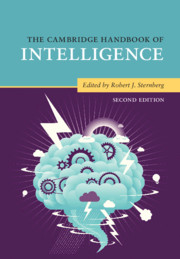Book contents
- The Cambridge Handbook of Intelligence
- The Cambridge Handbook of Intelligence
- Copyright page
- Dedication
- Contents
- Figures
- Tables
- Contributors
- Preface
- Part I Intelligence and Its Measurement
- Part II Development of Intelligence
- Part III Intelligence and Group Differences
- Part IV Biology of Intelligence
- Part V Intelligence and Information Processing
- Part VI Kinds of Intelligence
- Part VII Intelligence and Its Role in Society
- Part VIII Intelligence and Allied Constructs
- Part IX Folk Conceptions of Intelligence
- Part X Conclusion
- 50 Speculations on the Future of Intelligence Research
- Author Index
- Subject Index
- References
50 - Speculations on the Future of Intelligence Research
from Part X - Conclusion
Published online by Cambridge University Press: 13 December 2019
- The Cambridge Handbook of Intelligence
- The Cambridge Handbook of Intelligence
- Copyright page
- Dedication
- Contents
- Figures
- Tables
- Contributors
- Preface
- Part I Intelligence and Its Measurement
- Part II Development of Intelligence
- Part III Intelligence and Group Differences
- Part IV Biology of Intelligence
- Part V Intelligence and Information Processing
- Part VI Kinds of Intelligence
- Part VII Intelligence and Its Role in Society
- Part VIII Intelligence and Allied Constructs
- Part IX Folk Conceptions of Intelligence
- Part X Conclusion
- 50 Speculations on the Future of Intelligence Research
- Author Index
- Subject Index
- References
Summary
This chapter poses some of the principal questions that will confront the future of intelligence research. Among these questions are (1) What is the role of the brain in intelligence and of intelligence-enhancing drugs upon the brain? (2) Does culture affect what intelligence is or just what it is conceived of as being? (3) What are the genetic bases of intelligence? (4) Can intelligence of individuals be meaningfully increased by environmental interventions? (5) Is high intelligence having negative as well as positive effects on the world, and what is to be done about it? (6) Will artificial intelligence ultimately be dangerous to the world? (7) What effects are social media and the Internet more generally having on both individual and collective intelligence? (8) Why are people who are so intelligent at times so lacking in rational and wise thinking? (9) Are there noncognitive (e.g., emotional, attitudinal, motivational) aspects of intelligence and, if so, what are they? (10) What kinds of environmental factors inadvertently decrease intelligence?
Keywords
- Type
- Chapter
- Information
- The Cambridge Handbook of Intelligence , pp. 1203 - 1214Publisher: Cambridge University PressPrint publication year: 2020



